April 2019: Olive Tree

Volume II/Issue 36/April 2019


From The Editorial Desk
Build an Altar
During King David’s reign, the tabernacle (the movable tent) that Moses had made was erected at the high place in Gibeon. This tabernacle represented the presence of God among the people.
At one particular time when David sinned, he needed a more immediate and convenient altar, so God sent him to a man named Ornan and told David to build on Ornan’s threshing floor. 1 Chronicles 21:26 says, “ And he built there an altar to the Lord: and he offered holocausts, and peace offerings, and he called upon the Lord, and he heard him by sending fire from heaven upon the altar of the holocaust."
Saint Paul says that we, as individuals, we are temples. I Corinthians 6:19 says, ""
It is my responsibility to build an altar to the Lord in my heart, maintain it, and visit it frequently. I take my sin, sorrow, faults, and failings to God at this altar and offer them as I would a burnt offering, letting God’s fire consume them and reprove me. I take my confidences, joys, and praise as peace offerings, willingly sharing them with my Master and continually submitting them to Him. I call on the Lord at my altar, discussing my requests and desires with Him, and seeking His face concerning them.
Finally, it is at the altar where God answers from Heaven by fire. Since my body is a temple, I can never leave my altar. As I maintain altar-consciousness and listen for God’s voice, I will hear Him speak through His Word, through His Church, and even through observations of nature, which after all is the work of His hands.
I encourage you today to become altar-conscious. If you’re just starting out, build your heart’s altar to the Lord by making a determination to spend daily time with Him. You may have to repair your neglected altar. That’s all right; just do it and take up where you left off. If you already spend regular times with God, keep it up. Whatever the case, it’s a joy to know that God eagerly desires to spend time with us.

Conversion
When we think of conversion, we think of someone coming into the true Church of Jesus Christ, the Catholic Church. However, there is what spiritual authors often call the second conversion. This is when we get serious about living the Catholic way of life. For those of us baptized in our infancy, there comes a time, when we must take the Catholic way of life seriously. If we do not, then we will become worse than the pagans surrounding us. We will be worse than the Pharisees, whom Jesus called whited sepulchers. (Matthew 23:27) In fact, we can become proud of our apparent Catholicism, which consists of external practices only rather than in a heart that is ready and willing to serve God and do whatever He may ask of us.
Father Ralph Pfau, the first priest in AA writes: “In the middle ages this change was called a conversio mores which literally meant a complete change of customs and habits.” This conversion requires us to move from a lax life of self-indulgence to a life of sincere service of Almighty God. How many of us are half-hearted at best in the spiritual life?
The Holy Ghost says: “I know thy works, that thou art neither cold, nor hot. I would thou wert cold, or hot. But because thou art lukewarm, and neither cold, nor hot, I will begin to vomit thee out of my mouth.” (Apocalypse 3:15-16) Rather strong words, but words we need to take to heart. Lukewarmness comes on most of us imperceptibly. We find that we have slacked off from our spiritual life into a life of lukewarm self-indulgence.
This Lent let us look seriously at our life and see where we truly are. Let us not deceive ourselves, but be brutally honest and come before God. “Dear Lord, I find that I am not where you would have me be. Bring me home, no matter what it may cost me. I am ready and willing for you to change my heart into what it should be. Change me, dear Lord.”
Soon we will begin our meditations on the Passion in Holy Week. We will read all of the events of our salvation. Jesus was not half-hearted, but desires to give His all for our salvation. How do we return this selflessness? Are we selfish or selfless. As we consider what all Jesus suffered, let us ask ourselves, what am I willing to suffer for Jesus and for my neighbor?
Saint Ignatius of Loyola said: “Of a hundred persons devoted to prayer, more than ninety are self-willed.” Let us consider this well. We may have a prayer life, but if we are still selfish and self-willed, we are not where we should be. Saint Alphonsus says: “All bad passions spring from self-love.” Self-love leads to selfishness and being self-willed. Basically these are all fingers on the same selfish hand.
Louis of Granada writes in his work, The Sinner's Guide: “St. Thomas gives us a profound reason for this. All sin, he says, proceeds from self-love, for we never commit sin without coveting some gratification for self. From self-love spring those three branches of sin mentioned by St. John: “The concupiscence of the flesh, the concupiscence of the eyes, and the pride of life” (I John 2:16), which are love of pleasure, love of riches, and love of honors. Three of the deadly sins, lust, gluttony, and sloth, spring from love of pleasure, pride springs from love of honors, and covetousness from love of riches. The remaining two, anger and envy, serve all these unlawful loves. Anger is aroused by any obstacle which prevents us from attaining what we desire, and envy is excited when we behold anyone possessing what our self-love claims.”
When we truly convert, we must put away our life of sin, especially our pet sins. We must stop making excuses and ask God to purify us completely. Jesus prayed in the garden: “Father, if thou wilt, remove this chalice from me: but yet not my will, but thine be done.” (Luke 22:42) Let us make this prayer our way of life.

How Much More?
Similar to everyone else, I like to save money where I can. I suppose one of the ways I "save" money is buying the cheap brands for products when possible. In other words, why should I pay four or five dollars for a brand-name item when the cheap dollar-store variety works just as well? I suppose it depends on the product, obviously. Sometimes this strategy works great and saves you money to begin with. Other times it may end up costing you money in the long run. Case in point. A clogged up sink. I proposed saving money by buying the "cheap" generic versions of the drain cleaner. I insisted on buying the "generic" drain cleaners because I could not fathom paying six or seven dollars for a brand-name when I could just spend a buck-fifty and be done with it. The problem is that the generic version for a "buck-fifty" didn't work so well and I had to repeat the process another two times, still with no success and then ultimately ended up spending the six dollars for the "heavy-duty," "brand-name" drain cleaner and, voila!, drain is cleaned in a snap! Just like that! My efforts, though, at the beginning were in vain especially considering I spent money on products that really did not work to begin with, not to mention multiple trips to the store. Now, my purpose in writing this is not to get people to only buy name-brand products as opposed to cheaper, less-known products. No, I am just using this as an example of times where we have tried and tried and tried, without success, and then, boom!, we finally succeed with amazing results. I just used the drain-cleaning example because it came to mind but I know each one of us can come up with our own example of doing something repeatedly without much success and then we end up with amazing results!
In the Ninth Chapter of the Letter to the Hebrews, we are reminded of the sacrifice of bulls and goats made by the high priest in the Temple. "For if the blood of bulls and of goats, and the ashes of an heifer sprinkling the unclean, sanctifieth to the purifying of the flesh; how much more shall the blood of Christ, who, through the eternal Spirit, offered himself without spot to God, purge your conscience from dead works to serve the living God?" (Hebrews 9:13-14) We are reminded in this chapter that if the blood of goats, and bulls and heifers helps to sanctify the "unclean," "how much more shall the blood of Christ" (v. 14) sanctify the unclean? You see, for countless generations, the high priests would make sacrifices behind the second veil, as we are reminded in this chapter, to atone for the sins of God's people. As we are reminded, the high priest went in alone to offer up sins for God's people once a year. But it is the Blood of Christ which turned out to be the ultimate sacrifice. We can try and try and try to fix things ourselves, but it is only Our Blessed Saviour Who can save us from our sins. Perhaps you have had the experience of being in a jam and you tried and tried and tried to get things right and it just seemed to get worse and worse and worse. And then you placed the situation in God's hands and within a short time, you noticed everything got better. If our efforts are good . . . . Christ's are better. If the blood of sacrificed goats and bulls is good . . . Christ's Blood is better. Never fail to put your life in God's hands. Do your part, yes, but always look to Christ for inspiration. Always look to God for how to live your life better. Always look towards the Holy Ghost for inspiration. Give your life to God and live your life as His servant. Living life our way may be good but living life God's way is better.
"In Him we have redemption through His blood, the forgiveness of sins, according to the riches of His grace." (Ephesians 1:7)
"Much more then, having now been justified by His blood, we shall be saved from wrath through Him." (Romans 5:9)
Prayer in Honor of The Most Precious Blood of Jesus
"O precious Blood of Jesus, infinite price paid for the redemption of sinful mankind. O Divine Blood, drink and laver of our souls, standing between us and the Father pleading mercy.
With all my heart I adore You, sweet Lord, and offer reparation for the insults, outrages and ingratitude, which You continuously receive from human beings, especially those who dare blaspheme the Divine Blood You shed for us.
Bless this Blood of Infinite value. Bless the fire of Jesus’ Love who shed it to the last drop for us. Where would I be if not for this Divine Blood that redeemed me? Indeed, Lord, I have drawn if from You to the last drop. What love! Thank You for this saving balm!
May every heart, every tongue, now and forever, praise and thank this priceless balm, this saving Blood, this fountain of crimson Mercy welling up from the fountain of infinite Love. Amen."

The Funny Pharmacy
A joyful mind maketh age flourishing: a sorrowful spirit drieth up the bones. - Proverbs 17:22


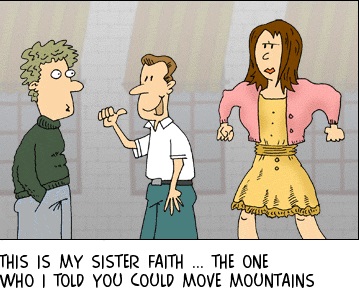

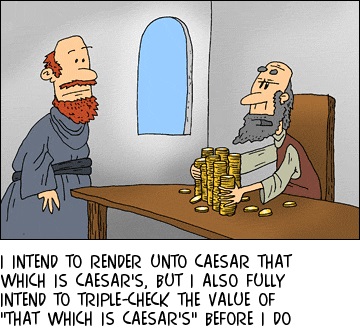


What are these other groups, sedevacantists and SSPX and so on?
Anyone who accepts Vatican 2’s teachings and the conciliar “popes” professes communion with the conciliar church in the Vatican. This includes many churches today one might see who claim to be Catholic, and which were probably actually Catholic if they existed prior to 1958.
There are those in the “indult” groups of “latin mass” communities which accept Francis as “pope” (as of this writing in 2015), including the Priestly Fraternity of Saint Peter (FSSP) and “latin mass” locations listed on the Ecclesia Dei Commission listings. Then there is the Society of St. Pius X (SSPX) which rejects Vatican 2 but accepts the conciliar claimants to the papacy.
There are a few priests who have the same views on who is pope and Vatican 2 and operate in a similar way to the SSPX and call themselves “independent” priests.
Sedeprivationists believe that conciliar claimants to the papacy are “material, but not formal” popes. They believe the conciliar elections had some validity but that the person elected did not totally become pope. Sedevacantists believe that there is currently no pope. Among sedevacantists, some reject sedevacantist clergy and are called “home aloners”, as they stay at home and pray for the situation to be rectified today.
Then there are conclavists, which generally refers to sedevacantists who have held a papal election. Pope Michael’s election is the first serious conclavist election which we can verify. A few elections followed after his, with some resigning or otherwise dying of old age with no successor.
From the above mentioned indult to sedevacantist groups mentioned, we sometimes call these “traditionalism” to refer to in a sense another group of churches distinct from the conciliar church, but which we do not consider to be the Catholic Church.

The Pope Speaks: April 2019
What Is Yet Wanting To Me?
A good mother can simply look over to her children and give THE LOOK. The children know from their mother's look, what is expected of them and the consequences should they not do what is expected. A lot can be said with a look, and we find this in Sacred Scripture as well.
Jesus had warned Peter that he would deny Him. After doing so, we read: “And the Lord turning looked on Peter. And Peter remembered the word of the Lord, as he had said: Before the cock crow, thou shalt deny me thrice.” (Luke 22:61) Consider what all Jesus communicated in that one look. We find the result in the next verse: “And Peter going out, wept bitterly.” One look brought about repentance.
And now to our main story, which is related in two of the Gospels:
“And behold one came and said to him: Good master, what good shall I do that I may have life everlasting? Who said to him: Why asketh thou me concerning good? One is good, God. But if thou wilt enter into life, keep the commandments. He said to him: Which? And Jesus said: Thou shalt do no murder, Thou shalt not commit adultery, Thou shalt not steal, Thou shalt not bear false witness. Honour thy father and thy mother: and, Thou shalt love thy neighbour as thyself. The young man saith to him: All these I have kept from my youth, what is yet wanting to me? Jesus saith to him: If thou wilt be perfect, go sell what thou hast, and give to the poor, and thou shalt have treasure in heaven: and come follow me. And when the young man had heard this word, he went away sad: for he had great possessions. ” (Matthew 19:16-22)
“And embracing them, and laying his hands upon them, he blessed them. And when he was gone forth into the way, a certain man running up and kneeling before him, asked him, Good Master, what shall I do that I may receive life everlasting? ... Thou knowest the commandments: Do not commit adultery, do not kill, do not steal, bear not false witness, do no fraud, honour thy father and mother. But he answering, said to him: Master, all these things I have observed from my youth. And Jesus looking on him, loved him, and said to him: One thing is wanting unto thee: go, sell whatsoever thou hast, and give to the poor, and thou shalt have treasure in heaven; and come, follow me. Who being struck sad at that saying, went away sorrowful: for he had great possessions. (Mark 10:17, 19-22)
What prompted this man to come to Jesus? We are not told, but we can work out what may have happened. He had heard of Jesus and the Holy Ghost prompting him to go see Jesus, because the Father had a mission for this man. And so he approached Jesus and asked: “Good master, what good shall I do that I may have life everlasting?” Saint Matthew says the man asked: “what is yet wanting to me?” The Holy Ghost had prompted the man to come and the man may have known deep down that God wanted more from him, which prompted him to ask the question.
And what happens next? Saint Mark gives us more detail: “And Jesus looking on him, loved him, and said to him: One thing is wanting unto thee: go, sell whatsoever thou hast, and give to the poor, and thou shalt have treasure in heaven; and come, follow me.” What is translated as looking on him has more meaning in the Latin. The word used is intuit from which we get the word in English intuition. And so this look of Jesus has much meaning. Jesus not only conveyed His message through word, but also through the look on His holy face.
Unfortunately this man was not ready to make the sacrifice, although it appears that he knew what Almighty God wanted from him. He knew God's will, which is what prompted him to come to Jesus in the first place. When He heard Jesus' words and knew the will of God through Jesus' look, instead of doing God's will, he went out and cried.
The Fathers of the Church are of the opinion that this man lost his soul, because he did not follow Jesus' advice. Some might argue that this is only a counsel and not a command. However, consider Who is asking. Jesus asked several others to “come follow Me.” What was their response? They left everything at once and followed.
Now the question we must ask our own self: “What is yet wanting to me?” What am I holding back, that Almighty God wants from me? Lent is a good time to ask this question, listen to the answer, and then do what God wants us to do. This is no time to hold anything back, but to give our all to Almighty God. To do otherwise may be an eternal fire hazard.


Dear soul, it is a joy to write to you again. This month's "decade" from Evagrius is laid out plainly; we have a number of brief but piercing observations which warn us again spiritual delusion and keep us on the right way as we live the life of prayer.
In these, I think that anything I might add would simply be superfluous weight to the Evagrian instructions. So let us simply read the following intently and vigilantly. When you and I next meet, we might have some questions or considerations we might share. Or we may not, too. Such is the life of prayer.
Let us hear Evagrius:
111. Another saint living the hesychastic life in the desert was attacked, as he was praying, by demons who for two weeks tossed him like a ball in the air, catching him in his rush-mat. They were completely unsuccessful in distracting his mind from fiery prayer.
112. When another monk was practicing inner prayer as he journeyed in the desert, two angels came and walked on either side of him. But he paid no heed to them, for he did not wish to lose what was better. He remembered the words of the Apostle: "Neither angels, nor principalities, nor powers... shall be able to separate us from the love of Christ." (Rom. 8:38-39).
113. The monk becomes equal to the angels through prayer, because of his longing to "behold the face of the Father who is in heaven." (cf. Matt. 18:10).
114. Never try to see a form or shape during prayer.
115. Do not long to have a sensory image of angels or powers or Christ, for this would be madness: it would be to take a wolf as your shepherd and to worship your enemies, the demons.
116. Self-esteem is the start of illusions in the intellect. Under its impulse, the intellect attempts to enclose the Deity in shapes and forms.
117. I shall say again what I have said elsewhere: blessed is the intellect that is completely free from forms during prayer.
118. Blessed is the intellect that, undistracted in its prayer, acquires an ever greater longing for God.
119. Blessed is the intellect that during prayer is free from materiality and stripped of all possessions.
120. Blessed is the intellect that has acquired complete freedom from sensations during prayer.

Saints from East and West
Saints whose feasts are celebrated this month
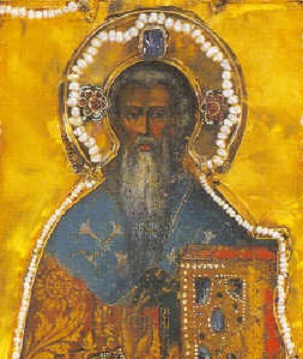
April 17 (Byzantine) - Saint Simeon of Persia
The Hieromartyr Simeon, Bishop of Persia, suffered during the time of a persecution against Christians under the Persian emperor Sapor II (310-381). He was the bishop of Seleucia - Xeziphon. They accused the saint of being in collaboration with the Greek realm and of subversive activities against the Persian emperor.
In the year 344 the emperor issued an edict which imposed a grievous tax upon Christians. When certain of them refused to pay it (this was fancied to be a rebellion), the emperor started a fierce persecution against Christians. They brought Saint Simeon to trial in iron fetters as a supposed enemy of the Persian realm, together with the two Priest-martyrs Habdelai and Ananios. The holy bishop would not even bow to the emperor, who asked why he would not show him the obligatory respect. The saint answered: "Earlier I did bow to thy dignity, but now, when I am led forth for this, to renounce my God and quit my faith, it doth not become me to bow to thee."
The emperor urged him to worship the sun, and in case of refusal he threatened to wipe out Christianity in the land. But neither urgings nor threats could shake the bravely steadfast saint, and they led him off to prison. Along the way the eunuch Usphazanes, a counsellor of the emperor, caught sight of the saint. He rose up and bowed to the bishop, but the saint turned away from him in reproach that he, a former Christian, out of fear of the emperor, now worshipped the sun. The eunuch repented with all his heart, he replaced his fine attire for coarse garb, and sitting at the doors of the court, he cried out bitterly: "Woe to me, when I stand before my God, from Whom I am cut off. Here was Simeon, and he hath turned his back on me!" The emperor Sapor learned about the grief of his beloved tutor and asked him what had happened. That one said openly to the emperor, that he bitterly regretted his apostasy and would no more worship the sun, but only the One True God. The emperor was surprised at such sudden decisiveness in the old man and he flatteringly urged him not to abjure the gods whom their fathers had reverenced. But Usphazanes was unyielding, and they condemned him to death. The only request of the Martyr Usphazanes was that the city heralds report that he died not for crimes against the emperor, but for being a Christian. The emperor granted his request.
Saint Simeon also learned about the end of the Martyr Usphazanes and with tears he offered up thanks to the Lord. When they brought him a second time before the emperor, Saint Simeon again refused to worship the pagan gods and he confessed his faith in Christ. The enraged emperor gave orders, in front of the eyes of the saint, to behead all the Christians in the prison. Without fear the Christians went to execution, blessed by the sainted hierarch, and they themselves put their heads beneath the sword. Thus also was beheaded the companion of Saint Simeon, the Priest Habdelai. When the line reached down to the Priest Ananios, he suddenly trembled. Then one of the dignitaries, Saint Phusikos, a secret Christian, became frightened that Ananios would renounce Christ, and he cried out loudly: "Fear not, elder, the sight of the cutting, and thou immediately wilt see the Divine Light of our Lord Jesus Christ." By this outburst he betrayed himself. The emperor gave orders to pluck out the tongue of Saint Phusikos and to flay the skin from him. Together with Saint Phusikos was martyred his daughter, the Martyress Askitrea. Saint Simeon went last to the executioner, and with a prayer he placed his head on the chopping-block (+13 April 344). The whole of the Paschal Week until 23 April executions continued. Also to accept a martyr's death was Saint Azates the Eunuch, a close official to the emperor. The sources indicate that 1000 Martyrs accepted suffering, and then still another 100 or 150 more.
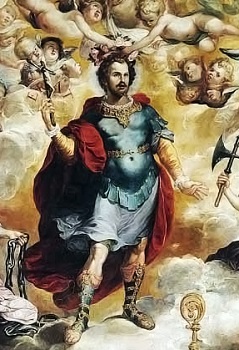
April 13 - Saint Hermenegild
Hermenegild and his brother Reccared were the two sons of the Visigothic king of Spain, Leovigild, by his first wife Theodosia. They were educated by their father in the Arian heresy, but Hermenegild married a zealous Catholic, Indegundis or Ingunda, daughter of Sigebert, king of Austrasia; his conversion to the true faith was due as much to her example and prayers as to the teaching of St Leander, archbishop of Seville. Leovigild was furious when he heard of his son's open profession of the faith, and called upon him to resign all his dignities and possessions. This Hermenegild refused to do. He raised the standard of revolt and, as the Arians were all-powerful in Visigothic Spain, he sent St Leander to Constantinople to obtain support and assistance. Disappointed in that quarter, Hermenegild implored the help of the Roman generals who, with a small army, still ruled the strip of Spanish land along the Mediterranean coast which remained in the possession of the Empire. They took his wife and infant son as hostages and made him fair promises which they failed to fulfil. For over a year Hermenegild was besieged in Seville by his father's troops, and when he could hold out no longer he fled to the Roman camp - only to be warned that those he had reckoned upon as his friends had been bribed by Leovigild to betray him. Despairing of all human aid, he entered a church and sought refuge at the altar. Leovigild did not venture to violate the sanctuary, but permitted his younger son Reccared, who was still an Arian, to go to his brother with an offer of forgiveness if he would submit and ask for pardon. Hermenegild took his father at his word and a reconciliation took place, the genuineness of which there seems no reason to doubt. Leovigild appears to have restored his elder son to some measure of his former dignities; but the king's second wife, Gosvinda, soon succeeded in estranging him once more from the unfortunate prince, and Hermenegild was imprisoned at Tarragona. He was no longer accused of treason but of heresy, his liberty being offered to him at the price of recantation. With fervent prayer he asked God to give him fortitude in his combat for the truth, adding voluntary mortifications to his enforced sufferings and clothing himself in sackcloth.
At Easter his father sent him an Arian bishop, offering to restore him to favour if he would receive communion from the prelate. Upon learning that Hermenegild had absolutely refused, Leovigild fell into one of the paroxysms of rage to which he was subject, and despatched soldiers to the prison with orders to put the young prince to death. They found him fully prepared and quite resigned to his fate. He was killed instantaneously by one blow from an axe. St Gregory the Great attributes to the merits of St Hermenegild the conversion of his brother Reccared and of the whole of Visigothic Spain. Leovigild was stung with remorse for his crime, and although he never actually renounced Arianism, yet when he was on his death-bed he commended his son Reccared to St Leander, desiring him to convert him to the orthodox faith. It is impossible to do otherwise than condemn the conduct of Hermenegild in taking up arms against his own father, but, as St Gregory of Tours has pointed out, his guilt was expiated by his heroic sufferings and death. Another Gregory, the great pope of that name, remarked of him that he only began to be truly a king when he became a martyr.


Books to feed your faith!
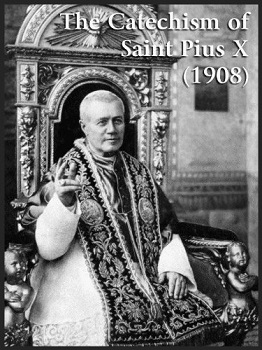
Catechism of Saint Pius X
$14.95
The Fathers of the Council of Trent showed at a very early date that they were satisfied with none of the existing works, and that they were fully alive to the need and necessity of preparing an authoritative Catechism. The realisation of their desire, however, was retarded for several years by events over which they had little control; and when the work was finally taken in hand another idea prevailed, resulting in the publication of a manual for the use of the clergy, and not, as originally suggested, a Catechism for children and uninstructed adults. Of the countless Catechisms that continued to appear, two — those of Bellarmine and Canisius — have steadily held their ground ever since, and to a large extent have served as the models of nearly an subsequent compilations of the kind. The influence of Canisius, however, has on the whole been limited to Germany; whereas Bellarmine's Catechism , which was written by command of Pope Clement VIII in 1597, has been copied in almost every other country in the world. At an early date it was translated into Arabic, Latin, Modern Greek, French, Spanish, German, English, and Polish. It had the warm approbation of Clement VIII, who prescribed it for use in the Papal States; of Urban VIII, who directed it to be adopted in all the Eastern missions; of Innocent XIII and Benedict XIV; particularly of the very important Council of all Italy, held at Rome, in 1725, which made it obligatory in all the dioceses of the peninsula; and finally of the Vatican Council which indicated it as the model for a proposed universal Catechism. Though Bellarmine's Catechism was largely followed as a model all over the world, yet, owing to the modifications introduced in diocesan editions, it came to pass in the course of time that almost every diocese had its own Catechism, differing in many respects from the Catechisms of other dioceses. The obvious inconvenience of this bewildering multiplicity of Catechisms occupied the attention of the Fathers of the Vatican Council, the great majority of whom were agreed as to the desirability of having a uniform small Catechism for the faithful all over the world. Early during the sittings of the Council, forty-one of the assembled Fathers devoted six sessions (February 10 to February 22) to an examination of the question; and the report which they drew up occupied the attention of the whole Council during the sittings of April 29 and 30. The question being put to a vote on May 4, an immense majority was found to be in favour of the compilation of a small uniform Catechism, to be compiled in Latin, translated into every language, and made obligatory in every diocese. But the approach of the Italian troops towards the walls of Rome brought the Council to an untimely end and there was no time to promulgate the constitution on the proposed uniform Catechism, so that it has not the force of law. The idea, however, has never been lost sight of. During the sitting of the first Catechetical Congress in 1880, the then Bishop of Mantua (later St. Pius X) proposed that the Holy Father be petitioned to arrange for the compilation of a simple, plain, brief, and popular Catechism for uniform use all over the world. Shortly after his elevation to the Chair of Peter, Pius X at once set about realising, within certain limits, his own proposal of 1880, by prescribing a uniform Catechism — the Compendium of Christian Doctrine — for use in the dioceses of the ecclesiastical province of Rome, at the same time indicating that it was his earnest desire to have the same manual adopted all over Italy. The text selected was, with slight modifications, that which had been adopted for some years by the united hierarchy of Piedmont, Liguria, Lombardy, Emilia, and Tuscany.

The Little Office of the Blessed Virgin Mary
$14.99
Originally published in 1915, this work is in conformity with the Decrees in place for the Little Office before Vatican II, which is the Traditional Little Office. The Little Office of the Blessed Virgin is one of the liturgical prayers of the Church, and she imposes it "on many of her children. Although the Little Office of Our Lady is considerably shorter than the ever-varying Office which the Clergy and Religious in solemn vows have to say, yet, coming as it does from the same authority, it is as much a liturgical prayer as the . Divine Office, and has the same claims to be considered a part of the official worship which the mystical Spouse of Christ, the Church, daily offers to her Divine Head. Prayer is the great duty of man here below: " We ought always to pray and not to faint" (Luke xviii. I). We appear before God under three different aspects: as individuals, as members of congregations or societies, and as members of a Divine Society. Hence there are three kinds of prayer: (I) private prayer, (2) prayer in common, and (3) the prayer of the Church, or liturgical prayer. Of the first kind, private prayer, Our Lurd spoke when He said: "But thou when thou shalt pray, enter into thy chamber, and having shut the door, pray to thy Father in secret, and thy Father who seeth in secret will repay thee" (Malt. vi. 6). The second kind, prayer in common, is that which we offer as members of congregations or societies. The prayers said by the members of a family, such as morning and night prayers, the prayers said together by the members of a congregation or a community, are better than individual prayers. Our Lord praised this kind of prayer when He said: "If two of you shall consent upon earth, concerning anything whatsoever they shall ask, it shall be done to them by My Father who is in heaven. For where there are two or three gathered together in My Name, there am I in the midst of them " (Matt. xviii. 19, 20). The third kind, liturgical prayer, is much more pleasing to God; it excels both private prayer and prayer in common. It is the prayer we offer as members of a Divine Society, the Holy Church. The public prayer of the Church may be looked upon as the public act of the whole body of the Church. Those who by their Rule, approved by the Church, are charged with saying the Office, whether it be the Divine Office or the Little Office of the Blessed Virgin, say it as public officers of the Church, who officially stand before the throne of God and make intercession for the whole body of Christ's Church. When performing this duty, even when alone, they cease to be private individuals; they are invested with the public character of ambassadors to the heavenly Court. But an ambassador's personal merit is of very secondary concern: What does matter is the dignity and power of him who sent the ambassador, and whom he represents. Those who take part in this public Office do not stand before God in their own name, nor yet in the name of the faithful assembled, but in the name of the Holy Church appointed by God. Her service and prayer do not partake of the worth and devotion of the .angels, but of the worth of the mystical body of Christ. This prayer of the Church is the most excellent of prayers. Private prayer and prayer in common are doubtless very good, and highly pleasing to God; but they are human prayers, necessarily defective, made and said by men who are sinners, and not always altogether pleasing to God.
For More Good Traditional Catholic Books:


Easter Meat Pie

Prep: 45 minutes
Cook: 1 hour
Ready In: 1 hour 45 minues
Ingredients
4 (9 inch) unbaked pie crusts
2 pounds ricotta cheese
6 eggs
8 ounces mozzarella cheese, grated
1 pound cooked ham, chopped
1/2 pound Genoa salami, chopped
1/4 pound prosciutto, chopped
1/4 cup grated Parmesan cheese
Directions
Preheat oven to 325 degrees F (165 degrees C).
Place ricotta in a large mixing bowl and add eggs one at a time while mixing on low speed. Stir in mozzarella, ham, salami, and prosciutto until all ingredients are well combined. Line two 9 inch pans with pastry. Spoon half of mixture into each pan. Sprinkle half of the Parmesan cheese over each pie, then cover with top pastry. Crimp edges and cut steam vents in tops.
Bake in preheated oven for 1 hour, until crust is golden brown. Cool on racks.
Paska Bread

Prep: 30 minutesCook: 50 minutes
Ready In: 6 hours 40 minutes
Ingredients
For the Sponge:
2 (.25 ounce) packages active dry yeast
1/2 cup warm water (110 degrees F/45 degrees C)
1/2 cup white sugar
3 cups warm milk
4 cups all-purpose flour
For the Dough:
6 eggs, beaten
1/2 cup white sugar
1 cup butter, softened
1/4 teaspoon salt
1/4 teaspoon lemon zest
12 cups all-purpose flour
1 egg
1 tablespoon water
2 tablespoons butter, melted
Directions
Proof the yeast in 1/2 cup warm water in a large bowl until slightly frothy.
In the meantime, dissolve 1/2 cup sugar in the warm milk; allow to cool to lukewarm. Once cooled, add the milk mixture to the yeast mixture along with 4 cups of flour. Mix well with a wooden spoon. Cover and put in a dark, warm place until the mixture is bubbly and doubled in size, about 2 hours.
Stir in the beaten eggs, 1/2 cup sugar, 1 cup butter, salt, and lemon peel. Stir well to blend. Begin adding the remaining flour a cup at a time to form a very soft dough.
Knead the dough on a floured board until soft and elastic, about 10 minutes. Place the dough in a greased bowl, turning to coat all sides. Cover bowl with plastic wrap and allow to rise in a warm place until doubled, about 2 hours. Punch dough down, and allow to rise again for 30 minutes.
Divide dough into three parts (see Cook's Note). Shape into slightly rounded loaves, and place on greased baking sheets. Let rise until doubled, about 45 minutes to 1 hour. Beat 1 egg with 1 tablespoon water; brush onto loaves.
Preheat oven to 350 degrees F (175 degrees C).
Bake in preheated oven until loaves are deep brown, 45 to 50 minutes. Once they are done, brush the tops with melted butter for a soft crust.

Video sermons and instructions: Timeless timely truths for living the Faith
Passion Sunday 2011
Easter Sunday 2011
Easter 2013


VIE CATHOLIC RADIO EVENTS FOR APRIL

After our solemn commemoration of the last days and death of Our Lord we will spend the month of April celebrating. As Spring breaks forth even nature will join us as buds and blooms begin to surface and we spend this month basking in the joy of the Resurrection. We continue throughout the entire month our cry, "Christ is risen, Christ is truly risen." The Divine Mercy offers us the opportunity to begin again as though we were newly baptized. Easter is the feast of feasts, the joy and gladness of all Catholics. From Sunday to Sunday, from year to year, the Easters of this earth will lead us to that blessed day on which Christ has promised that He will come again with glory to take us with Him into the kingdom of His Father. Check out all the programs we have to offer this month!
The Stations of the Cross:
The Stations of the Cross are a 14-step Catholic devotion that commemorates Jesus Christ's last day on Earth as a man. The 14 devotions, or stations, focus on specific events of His last day, beginning with His condemnation. The stations are commonly used as a mini pilgrimage as the individual moves from station to station. At each station, the individual recalls and meditates on a specific event from Christ's last day. Specific prayers are recited, then the individual moves to the next station until all 14 are complete. Join us Tuesday, Thursdays and Saturdays as we walk the steps that Jesus walked. See Program Guide for times.
The Angelus and The Rosary:
Everyday the Angelus, which commemorates the Incarnation of Jesus, and the Rosary, which is a devotion in honor of the Virgin Mary, is said morning, noon and night. Follow along with us in prayer everyday!
Lamp and Light:
Lamp and Light Bible study takes the listener through the entire Bible, threading back and forth between the Old and New Testaments. Be sure to tune in so that you will not miss any part of the Bible study.
Sacred Moments:
It has been said that “The higher goal of spiritual living is not to amass a wealth of information, but to face sacred moments.” and that is what our desire is for you. To experience through our weekly devotion, a sacred moment. One that you can savor through out the day. One that reminds you that God is alive and active in your live.
Sunday Sermon:
You can listen to four Sunday Sermons, including one by Saint Alphonsus, each day that could cause permanent life changes by stepping on your toes!
Life Is Worth Living:
Fulton Sheen's renowned and inspiring television series was watched by millions of viewers from all walks of life and every religious belief. His timeless insights give wise, personal and inspiring guidance on the problems affecting our lives in today’s world. His talks cover an amazing variety of subjects, from the character of the Irish to the handling of teenagers. He discusses education, Christianity, relativity, and world affairs. He speaks about love, conscience, fear, motherhood, work. He tells amusing anecdotes, recites poetry, and ponders the fate of the free world as well as America’s destiny.
Fulton Sheen's Catechism:
...is a 50 part series on the fundamental teachings of the Catholic Church recorded in 1965 in the privacy of his own study. This Catechism program is truly priceless! Fulton Sheen's captivating voice and message comes through loud and clear, even for today.
Catechism Corner:
Catechism Corner discuss our Catholic faith in an easy to understand manner each week. The talks are given by our own in House Priest from the Rectory of the St. Helen Catholic Mission. You won't want to miss a lesson!
Family Theater:
Family Theater is a dramatic radio show which was produced by Family Theater Productions, a film and radio studio extension of the Family Rosary Crusade founded by the Holy Cross Priest, Father Patrick Peyton, CSC, as a way to promote family prayer. The motto of Holy Cross Family Ministries is "The family that prays together stays together."
Your Story Hour/The Bible Comes Alive:
Your Story Hour produces family-friendly radio dramas based on the Bible, historical heroes, and true-to-life adventures. Our stories--brought to life by talented voice actors, descriptive sound effects and compelling music--teach Christian values, positive character traits and principles for good decision-making.
Ranger Bill:
Ranger Bill is a Christian radio program from the 1950s. Ranger Bill stars Miron Canaday as the title character and Stumpy Jenkins. And Ed Ronne Sr. as Grey Wolf. The main character, Ranger Bill, is a forest ranger located in the town of Knotty Pine along the Rocky Mountains. The show describes the various tales of the adventures of Ranger Bill and his friends
Plus More!:
Paul Harveys' The Rest of The Story- The Rest of the Story consists of stories presented as little-known or forgotten facts on a variety of subjects with some key element of the story (usually the name of some well-known person) held back until the end
Jelly Telly- A 5 Minute Family Devotional featuring Clive & Ian's Character Quest! 12 short devotionals that will teach your kids all about important character traits from the Bible - from generosity to courage to compassion and more!
Creation Moments- presenting scientific evidence for the Bible and its literal truths. Each short program provides accurate, up-to-date information about new discoveries in God's creation.
Life Line- Short programs that communicates Biblical Truths in a humorous, thought-provoking way
No Apologies- is basic apologetic of the Catholic Church, that defends the faith, with a Marian emphasis.
Saints Meeting Saints- a short program sprinkled through out the day that gives Saints in the making on earth a chance to learn more about the Saints in heaven!
*NEW*
Live of the Saints- Short Audio clips through out the day and week that gives you a brief biography of the Saints who have feast days during the week.
These are just some of the little jewels you can hear through out the week.
Music To Tickle Your Ears:
We have a whole genre of musical programs. Such as Friday Night Gospel Bluegrass, Saturday Night Alive-Praise and Worship, and Sounds of Joy-Sacred Music. That doesn't count the Gregorian Chant heard every day four times a day.


Birds of a Feather
Genesis 1:20
God also said: Let the waters bring forth the creeping creature having life, and the fowl that may fly over the earth under the firmament of heaven.
The Encyclopaedia Britannica describes feathers as “the component structure of the outer covering and flight surfaces of all modern birds”, and goes on to say: “Unique to birds, feathers apparently evolved from the scales of birds’ reptilian ancestors”.
Yet, Wikipedia does not believe feathers are unique to birds because they state in many articles that most, if not all, dinosaurs also had feathers, stating dogmatically: “Several non-avian dinosaurs had feathers on their limbs that would not have functioned for flight”. Even the Britannica article goes on to show a picture of a feathered dinosaur.
Perhaps it is easier for evolutionists to believe that dinosaurs evolved into birds if dinosaurs also had feathers. But this merely moves, rather than solves, the problem that evolutionists have in trying to establish how feathers evolved in the first place. Britannica and Wikipedia both suggest that feathers evolved from reptilian scales; yet, Wikipedia reminds us that feathers “are considered the most complex integumentary structures found in vertebrates”.
The barbs on feathers have to fit exactly into the barbules – which would be a remarkable coincidence for a chance random process. Moreover, scales, being simple structures, would have to divide over generations, in many various ways, to produce feathers. The minimum estimate is for eight evolutionary steps, none of which have been found in real life. The point must be understood – it is not that feathers are too complicated to evolve, but rather that the complexity of alleged intermediate forms is impossible to replicate without design.
Ref: Encyclopaedia Britannica, https://www.britannica.com/science/feather, accessed 6/30/2018.

Catechism Catch-Up
The Forgiveness Of Sin
All pardon for sins ultimately comes from Christ’s finished work on Calvary, but how is this pardon received by individuals? Did Christ leave us any means within the Church to take away sin? The Bible says he gave us two means.
Baptism was given to take away the sin inherited from Adam (original sin) and any sins we personally committed before baptism—sins we personally commit are called actual sins, because they come from our own acts. Thus on the day of Pentecost, Peter told the crowds, "Repent, Peter said to them, and be baptized, every one of you, in the name of Jesus Christ, to have your sins forgiven; then you will receive the gift of the Holy Spirit." (Acts 2:38), and when Paul was baptized he was told, "And now why tarriest thou? Rise up, and be baptized, and wash away thy sins, invoking his name." (Acts 22:16). And so Peter later wrote, "Whereunto baptism.....now saveth you also: not the putting away of the filth of the flesh, but the examination of a good conscience towards God by the resurrection of Jesus Christ." (1 Peter 3:21).
For sins committed after baptism, a different sacrament is needed. It has been called penance, confession, and repentance. and some have even called it reconciliation, each word emphasizing one of its aspects. During his life, Christ forgave sins, as in the case of the woman caught in adultery (John 8:1–11) and the woman who anointed his feet (Luke 7:48). He exercised this power in his human capacity as the Messiah or Son of man, telling us, "the Son of man hath power on earth to forgive sins," (Matthew 9:6), which is why the Gospel writer himself explains that God "had given such power to men" (Matthew 9:8).
Since he would not always be with the Church visibly, Christ gave this power to other men so the Church, which is the continuation of his presence throughout time (Matthew 28:20), would be able to offer forgiveness to future generations. He gave his power to the apostles, and it was a power that could be passed on to their successors and agents, since the apostles wouldn’t always be on earth either, but people would still be sinning.
God had sent Jesus to forgive sins, but after his resurrection Jesus told the apostles, "He said therefore to them again: Peace be to you. As the Father hath sent me, I also send you. When he had said this, he breathed on them; and he said to them: Receive ye the Holy Ghost. Whose sins you shall forgive, they are forgiven them; and whose sins you shall retain, they are retained." (John 20:21–23).
The Commission
Christ told the apostles to follow his example: "As the Father hath sent me, I also send you." (John 20:21). Just as the apostles were to carry Christ’s message to the whole world, so they were to carry his forgiveness: "Amen I say to you, whatsoever you shall bind upon earth, shall be bound also in heaven; and whatsoever you shall loose upon earth, shall be loosed also in heaven." (Matthew 18:18).
This power was understood as coming from God: "But all things are of God, who hath reconciled us to himself by Christ; and hath given to us the ministry of reconciliation." (2 Corinthians 5:18). Indeed, confirms Paul, "We are Christ’s ambassadors" (2 Corinthians 5:20).
Some say that any power given to the apostles died with them. Not so. Some powers must have, such as the ability to write Scripture. But the powers necessary to maintain the Church as a living, spiritual society had to be passed down from generation to generation. If they ceased, the Church would cease, except as a quaint abstraction. Christ ordered the apostles to, "Going therefore, making disciples of all nations." It would take much time. And he promised them assistance: "behold I am with you all through the days that are coming, until the consummation of the world." (Matthew 28:19–20).
If the disciples believed that Christ instituted the power to sacramentally forgive sins in his stead, we would expect the apostles’ successors—the bishops—and Christians of later years to act as though such power was legitimately and habitually exercised. If, on the other hand, the sacramental forgiveness of sins was what Fundamentalists term it, an "invention," and if it was something foisted upon the young Church by ecclesiastical or political leaders, we’d expect to find records of protest. In fact, in early Christian writings we find no sign of protests concerning sacramental forgiveness of sins. Quite the contrary. We find confessing to a priest was accepted as part of the original deposit of faith handed down from the apostles.
The Fourth Lateran Council discussed confession. To combat the lax morals of the time, the council regulated the already-existing duty to confess one’s sins by saying that Catholics should confess any mortal sins at least once a year. The sacrament of confession was not "invented" at this time as some would say, but they took to issue an official decree about how frequently a sacrament must be celebrated.
The earliest Christian writings, such as the first-century Didache, are indefinite on the procedure for confession to be used in the forgiveness of sins, but a verbal confession is listed as part of the Church’s requirement by the time of Irenaeus (A.D. 180). He wrote that the disciples of the Gnostic heretic Marcus "have deluded many women. . . . Their consciences have been branded as with a hot iron. Some of these women make a public confession, but others are ashamed to do this, and in silence, as if withdrawing themselves from the hope of the life of God, they either apostatize entirely or hesitate between the two courses" (Against Heresies 1:22).
The sacrament of penance is clearly in use, for Irenaeus speaks of making an outward confession (versus remaining silent) upon which the hope of eternal life hangs, but it is not yet clear from Irenaeus just how, or to whom, confession is to be made. Is it privately, to the priest, or before the whole congregation, with the priest presiding? The one thing we can say for sure is that the sacrament is understood by Irenaeus as having originated in the infant Church.
Later writers, such as Origen (241), Cyprian (251), and Aphraates (337), are clear in saying confession is to be made to a priest. (In their writings the whole process of penance is termedexomologesis, which means confession—the confession was seen as the main part of the sacrament.) Cyprian writes that the forgiveness of sins can take place only "through the priests." Ambrose says "this right is given to priests only." Pope Leo I says absolution can be obtained only through the prayers of the priests. These utterances are not taken as novel, but as reminders of accepted belief. We have no record of anyone objecting, of anyone claiming these men were pushing an "invention."
Confession Implied
Note that the power Christ gave the apostles was twofold: to forgive sins or to hold them bound, which means to retain them unforgiven. Several things follow from this. First, the apostles could not know what sins to forgive and what not to forgive unless they were first told the sins by the sinner. This implies confession. Second, their authority was not merely to proclaim that God had already forgiven sins or that he would forgive sins if there were proper repentance.
Such interpretations don’t account for the distinction between forgiving and retaining—nor do they account for the importance given to the utterance in John 20:21–23. If God has already forgiven all of a man’s sins, or will forgive them all (past and future) upon a single act of repentance, then it makes little sense to tell the apostles they have been given the power to "retain" sins, since forgiveness would be all-or-nothing and nothing could be "retained."
Furthermore, if at conversion we were forgiven all sins, past, present, and future, it would make no sense for Christ to require us to pray, "forgive us our debts, as we also forgive our debtors," which he explained is required because "if you will forgive men their offences, your heavenly Father will forgive you also your offences. But if you will not forgive men, neither will your Father forgive you your offences." (Matthew 6:12–15).
If forgiveness really can be partial—not a once-for-all thing—how is one to tell which sins have been forgiven, which not, in the absence of a priestly decision? You can’t very well rely on your own gut feelings. No, the biblical passages make sense only if the apostles and their successors were given a real authority.
Still, some people are not convinced. One is Paul Juris, a former priest, now a Fundamentalist, who has written a pamphlet on this subject. The pamphlet is widely distributed by organizations opposed to Catholicism. The cover describes the work as "a study of John 20:23, a much misunderstood and misused portion of Scripture pertaining to the forgiveness of sins." Juris mentions "two main schools of thought," the Catholic and the Fundamentalist positions.
He correctly notes that "among Christians, it is generally agreed that regular confession of one’s sins is obviously necessary to remain in good relationship with God. So the issue is not whether we should or should not confess our sins. Rather, the real issue is, How does God say that our sins are forgiven or retained?"
Verse Slinging
This sounds fine, on the surface, but this apparently reasonable approach masks what really happens next. Juris engages in verse slinging, listing as many verses as he can find that refer to God forgiving sins, in hopes that the sheer mass of verses will settle the question. But none of the verses he lists specifically interprets John 20:23, and none contradicts the Catholic interpretation.
For instance, he cites verses like these: "Be it known therefore to you, men, brethren, that through him forgiveness of sins is preached to you: and from all the things, from which you could not be justified by the law of Moses. In him every one that believeth, is justified." (Acts 13:38–39); "And he said to them: Go ye into the whole world, and preach the gospel to every creature. He that believeth and is baptized, shall be saved: but he that believeth not shall be condemned." (Mark 16:15–16).
Juris says that verses like these demonstrate that "all that was left for the disciples to do was to ‘go’ and ‘proclaim’ this wonderful good news (the gospel) to all men. As they proclaimed this good news of the gospel, those who believed the gospel, their sins would be forgiven. Those who rejected (did not believe) the gospel, their sins would be retained." Juris does nothing more than show that the Bible says God will forgive sins and that it is through Jesus that our sins are forgiven—things no one doubts. He does not remotely prove that John 20:23is equivalent to a command to "go" and to "preach," merely that going and preaching are part of God’s plan for saving people. He also sidesteps the evident problems in the Fundamentalist interpretation.
The passage says nothing about preaching the good news. Instead, Jesus is telling the apostles that they have been empowered to do something. He does not say, "When God forgives men’s sins, they are forgiven." He uses the second person plural: "you." And he talks about the apostles forgiving, not preaching. When he refers to retaining sins, he uses the same form: "When you hold them bound, they are held bound."
The best Juris can do is assert that John 20:23 means the apostles were given authority only to proclaim the forgiveness of sins—but asserting this is not proving it.
His is a technique that often works because many readers believe that the Fundamentalist interpretation has been proven true. After all, if you propose to interpret one verse and accomplish that by listing irrelevant verses that refer to something other than the specific point in controversy, lazy readers will conclude that you have marshalled an impressive array of evidence. All they have to do is count the citations. Here’s one for the Catholics, they say, looking at John 20:21–23, but ten or twenty for the Fundamentalists. The Fundamentalists must be right!
The Advantages
Is the Catholic who confesses his sins to a priest any better off than the non-Catholic who confesses directly to God? Yes. First, he seeks forgiveness the way Christ intended. Second, by confessing to a priest, the Catholic learns a lesson in humility, which is avoided when one confesses only through private prayer. Third, the Catholic receives sacramental graces the non-Catholic doesn’t get; through the sacrament of penance sins are forgiven and graces are obtained. Fourth, the Catholic is assured that his sins are forgiven; he does not have to rely on a subjective "feeling." Lastly, the Catholic can also obtain sound advice on avoiding sin in the future.
During his lifetime Christ sent out his followers to do his work. Just before he left this world, he gave the apostles special authority, commissioning them to make God’s forgiveness present to all people, and the whole Christian world accepted this, until just a few centuries ago. If there is an "invention" here, it is not the sacrament of penance, but the notion that the sacramental forgiveness of sins is not to be found in the Bible or in early Christian history. - Unknown Author
(Taken from Catholic Answers web site with some editing to shorten it and to use for scripture references the Douay Rheims and Knox Catholic bible.)
Living Catholic:
Some Specific Questions On Authority
In the past we have spoken about the importance of having authority in our lives. I would like to do a quick review and then answer some frequently ask questions concerning authority in our lives.
In Scriptures, God outlines authority structures that provide direction for the family, church, workplace, and government. “Let every soul be subject to higher powers: for there is no power but from God: and those that are, are ordained of God.” (Romans 13:1).
God Is the Source of All Authority
By virtue of Who He is as creator of all things, God is the sovereign ruler of the universe. He has all power and all authority, and He entrusts roles of leadership to individuals in the family, the church, the workplace, and the government.
The orderliness we find in structures of authority reflects the order of God’s own nature. God is a Trinity: the Father, the Son Jesus Christ, and the Holy Spirit. The Father sent the Son into the world as Savior and Redeemer. (See I John 4:9.) Jesus was obedient to God the Father. (See John 5:19.) When Jesus returned to heaven, He and the Father sent the Holy Spirit to comfort Jesus’ disciples, lead them in all truth, remind them of the words of Jesus, and empower the Apostles to carry out Jesus’ commission to spread the Gospel. (See John 14:26, 15:26, and Acts 1:8.)
Each member of the Trinity works within the structure of authority and fulfills a specific role, perfectly complementing the others and demonstrating God’s glory. The members are not independent of one another, but God the Father is recognized as the authority Who directs and empowers the Son and Holy Spirit to carry out His will.
Four Biblical Authority Structures
God ordained human authority in four areas and established a specific chain of command in each area. This structure does not express superiority or inferiority. Just as each member of the Trinity is essential to express the fullness of God, so within social structures each role in the chain of authority is necessary for the success of the relationship.
Family: Husband—Wife—Children
God entrusts husbands with the leadership of the family unit. A husband is to love his wife as he loves himself. A wife is to submit to the leadership of her husband, coming alongside him as a helpmate. Parents are responsible to train their children, and children are to honor and obey their parents. (See Ephesians 5:21–6:4 and Proverbs 6:20–21.)
Government: National leaders—Local officials—Citizens
In Scripture we are instructed to respect and obey government authorities and ordinances and to live honorably within our communities. National leaders and local officials are to punish evildoers and honor those who do well. (See I Peter 2:13–17 and Romans 13:1–5.)
Church: Church leaders—Church members
Within the church, the leadership of our Popes, Bishops, and Priest is essential for the health of the Body of Christ. Believers are to honor and respect the clergy and to submit to one another and walk in humility. (See Ephesians 4:11–16, Hebrews 13:17, and I Peter 5:1–11.)
Business: Employers—Employees
Employers are challenged to act with equity and care as they oversee employees, patterning their behavior after God Himself, Who is their authority. Employees are responsible to serve well, doing their work wholeheartedly as unto the Lord. (See Colossians 3:22–4:1 and I Peter 2:18.)
That was the review. Here are the most asked questions concerning Authority:
How old do I have to be before I am out from under authority?
We never outgrow the need to be under authority, and, in fact, we are commanded to be under authority at all times. Ye young men, be subject to the ancients. And do you all insinuate [to gently introduce] humility one to another, for God resisteth the proud, but to the humble he giveth grace.(I Peter 5:5)
When does the parental "chain of responsibility" end?
The parental "chain of responsibility" ends when they delegate that authority to someone else- as in marriage or when some one enters the religious life. However, even before this, a certain measure of independence should be earned by learning to discern and obey the wishes of parents. When they are confident that we will do what they would do in a given situation, they will give more freedom to make decisions.
What if I am an adult and still single?
By this time, we should have earned the position of being in a "chain of counsel" If we haven't, there must be some serious deficiencies in our attitudes or understanding.
Whatever our age, however, we are instructed in Scripture and by the Church to always be responsive to our parents counsel: "Hearken to thy father, that beget thee: and despise not thy mother when she is old." (Proverbs 22:23)
Under whose authority am I if my parents are divorced?
The Parent who is legally responsible for you becomes your direct chain of responsibility. The separated parent may be a part of your chain of counsel. If the parent with whom you are living remarries, he or she automatically delegates part of his or her authority to your step parent.
What if parents don't care what I do?
There are reasons why a parent has ceased caring what his teen-ager does. The main reason is usually that in the past the teen-ager has had a strong will and has done what he wanted to anyway. The parents then just stop competing with him.
When a teen-ager dedicates his life to the Lord and clears his conscience with his parents and places himself under their authority, he or she will usually see a gradual or a dramatic change in their concern for what he or she does.
What if I'm single and living in an apartment?
First, be very sure that God has led you to move away from your parents, and that they were fully in harmony with the move. When God designed the family structure, He purposed that each one in the family meet basic needs for the others-especially social needs. When a single person leaves his family apart from God's direction, he exposes himself to many unnecessary temptations to wrongly fulfill these social needs. If your parents are in full harmony with your move to another location, it is important to maintain good lines of communication with them in order to receive counsel from them.
What if I am a widow or divorced?
Your direct line of authority would be to God. However, it would be very essential to build around your life as many godly counselors as you can, especially parents and parents-in-law. God takes special care of the widow. He is their protector: "Who is the father of orphans, and the judge of widows. God in his holy place" (Psalms 67:6 DRB/ 68:5) The book of Ruth in the Old Testament gives significant guidance to the young widow.
If you are divorced and your former husband is not remarried, take whatever steps you can to be reunited. By so doing, you will be able to get back under his "umbrella of protection," and allow God to work through the marriage to achieve Christ's character. If you have done what you can and still find your relationship broken, then your line of authority would be to God, and you will want to build the same godly counselors as the widow would.
What if I married the wrong person?
Your marriage may not have been one that God would have arranged; however, since He has established the authority of the marriage relationship, He will use whatever marriage you enter into to perfect His character in you. When your ways please the Lord, He will will even make your enemies to be at peace with you. (Proverbs 16:7)
What if I don't respect the authority over me?
It is important that we learn how to distinguish between an authority's position under God and his human personality. We are to reverence his position, although at the same time we may be very aware of personality deficiencies.
To say that we reject an authority because we don't respect him would be as much in error as tearing up a speeding ticket because we didn't like the attitude of the police officer.

Pray for the Holy Father! Pray with the Holy Father!
- Your prayers are asked this month and every month for the intentions of the Holy Father, Pope Michael.
- Be sure to keep the new foundation of St. Helen Catholic Mission in your prayers. Why not go on over to the site now and see what they have to offer and how you might be able to help!
- Your prayers are asked for Father Francis Dominic as he embarks upon the important work entrusted to him within the Church.
- Please pray for Brother Stephen's wife who is having health issues. May God grant the swift grace of His healing!
- Pray for those outside the Church and those who do not know God, that they may see the light of grace and be led safely home to the refuge of the Holy Catholic Church.
- As always, we also ask that you pray for yourself! Never forget your own state of soul. God is calling you to His service in His love. We know that our Lord can count on you to answer.
- We are all praying especially for you, too. May you correspond with every grace of God!
- In what other needs or intentions may we pray for you? Let us know!



To Donate by Mail:
Our address is
Vatican in Exile
829 NE Chester
Topeka, Kansas 66616
Make Checks payable to:
Vatican in Exile





 Follow
Follow


